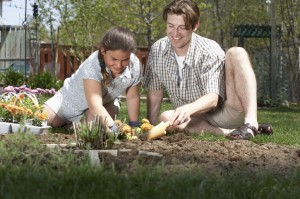Around the world, the buzzword in gastronomic and health circles alike, is ‘slow’. With the scientific world publishing countless studies on the health benefits of the ‘Mediterranean Diet’, which is centred on consuming fresh, seasonal fruits, vegetables, grains and legumes, and recent findings on the higher antioxidant content of organic farm vegetables, families around the world are keen on living healthier, and longer than ever before. Despite the undoubted health benefits of small farm-grown vegetables, many families forego buying healthy because of the higher prices associated with health food. The antidote is simple: grow your own produce! Then, you know exactly how your fruits and vegetables are grown, what fertilisers you have used to bring them to life, and the exact techniques which go into making them so flavourful and colourful. These are just a few reasons why it is worth getting the whole family involved in gardening.
Children are suffering from ‘Nature deficit disorder
Studies show that many children spend up to 90 per cent of their time indoors, solely focused on their tablets and iPads, to the point that they are suffering from what Author, Richard Louv, calls ‘Nature deficit disorder’. In order for children to value and fight for a sustainable Planet, argues Louv, it is vital that they learn to love and appreciate Nature by spending time in it – by taking part in outdoor activities, gardening, and helping to rebuild local ecosystems by planting autochthonous plants. Otherwise, what exactly are they supposed to be fighting for?
Children and adults alike are battling the obesity epidemic
In the US and in many other developed countries, obesity continues to be one of the biggest health threats. Obesity is related to everything from heart disease right through to various cancers and Type II diabetes, and it poses alarmingly high health care costs for our country. Children take great delight in consuming the fruit and vegetables they grow with their very own hands. Gardening is a wonderfully effortless, natural way to get children to love and be nurtured by what they grow. These values are indeed welcome in a society where more and more children are either overweight, or facing eating disorders, becoming bulimic or anorexic owing to unhealthy eating. By growing a garden, children can begin to value quality produce and the effect it can have on their health.
Gardening makes fruits and vegetables more accessible to families
Many fashionable organic stores charge high prices for healthy produce. In part, it is because until more government subsidies are provided to organic farmers, it is difficult for prices to compete with those of conventionally grown produce. When you grow your own seasonal garden, you can considerably cut down on the costs of grocery shopping. Moreover, you needn’t worry about surplus produce, since there are many ways you can make it last, through techniques like preserving and drying. You can make a wealth of delicious meals and snacks for your family on a very small budget, leaving any surplus amounts for fun days out, or for special treats.
Homegrown produces is healthier for the whole family
When you build your own garden, you can grow the healthiest produce possible, by avoiding chemical pesticides and fertilisers. If you opt to go natural, the benefits you will accrue are plentiful. One recent study has finally sealed the debate on whether or not organic is better for you, by showing that organic produce does, indeed, have significantly higher antioxidant levels than conventionally grown produce. Moreover, organic produce has less cadmium, a toxic metal that can build up in the liver and kidneys, causing damage to these organs.
Homegrown produce is flavour-packed
When you grow fruits and vegetables naturally, they bear all the colour and flavour that Nature intended. The thought of biting into a ripe, juicy, red tomato, with its irregular shape and wonderful imperfections, or enjoying sweet strawberries, is highly motivating for parents and children alike.
Growing fruits and vegetables teaches us all important life lessons, including the importance of setting goals, overcoming obstacles and working together as a team. Staying indoors and becoming gadget-obsessed isn’t just a problem in so far as not getting enough time in Nature is concerned; gadgets can also come between families, taking up precious time that parents and children could be spending together. We can think of few more fruitful ways of bonding together, than picking up our gardening tools and heading four our beautiful, bountiful family garden.
This is a guest post from Helen Gough.
Prior to working in writing I was employed in the healthcare sector for many years and was lucky enough to have a varied career that took in many aspects of helping people, particularly in matters relating to diet, nutrition and fitness. When I became a mother I think my perspective on life changed and I decided I wanted to put my energies into looking after my own family – so took to writing articles on the topics I knew about as a way to share my knowledge – Helen.
Citations
www.richardlouv.com/blog/bring-down-the-barriers-five-causes-of-nature-deficit-disorder-five-challen/
www.childrenandnature.org/about/nature-deficit-disorder/
www.eartheasy.com/blog/2014/09/6-unexpected-health-benefits-of-gardening/
www.bulimia.com/us/iowa/
www.runnersworld.com/nutrition-for-runners/study-organic-produce-higher-in-antioxidants
www.kidsgardening.org/node/13152







 Twitter
Twitter Facebook
Facebook
Hello Helen,
I have enjoyed reading your post but most importantly the last point. I totally agree that homegrown food is often associated with best flavor rather those purchased from food stores. Thanks for sharing.